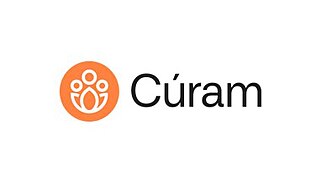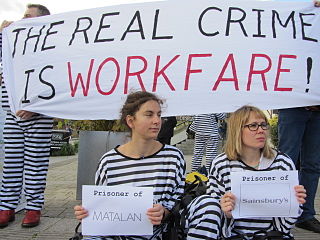
Social services are a range of public services intended to provide support and assistance towards particular groups, which commonly include the disadvantaged. They may be provided by individuals, private and independent organizations, or administered by a government agency. Social services are connected with the concept of welfare and the welfare state, as countries with large welfare programs often provide a wide range of social services. Social services are employed to address the wide range of needs of a society. Prior to industrialisation, the provision of social services was largely confined to private organisations and charities, with the extent of its coverage also limited. Social services are now generally regarded globally as a 'necessary function' of society and a mechanism through which governments may address societal issues.

Welfare spending is a type of government support intended to ensure that members of a society can meet basic human needs such as food and shelter. Social security may either be synonymous with welfare, or refer specifically to social insurance programs which provide support only to those who have previously contributed, as opposed to social assistance programs which provide support on the basis of need alone. The International Labour Organization defines social security as covering support for those in old age, support for the maintenance of children, medical treatment, parental and sick leave, unemployment and disability benefits, and support for sufferers of occupational injury.
Welfare reforms are changes in the operation of a given welfare system aimed at improving the efficiency, equity, and administration of government assistance programs. Reform programs may have a various aims; sometimes the focus is on reducing the number of individuals receiving government assistance and welfare system expenditure, and at other times reforms may aim to ensure greater fairness, effectiveness, and allocation of welfare for those in need. Classical liberals, neoliberals, right-wing libertarians, and conservatives generally argue that welfare and other tax-funded services reduce incentives to work, exacerbate the free-rider problem, and intensify poverty. On the other hand, in their criticism of capitalism, both social democrats and other socialists generally criticize welfare reforms that minimize the public safety net and strengthens the capitalist economic system. Welfare reform is constantly debated because of the varying opinions on a government's need to balance providing guaranteed welfare benefits and promoting self-sufficiency.
The New Deal was a workfare programme introduced in the United Kingdom by the first New Labour government in 1998, initially funded by a one-off £5 billion windfall tax on privatised utility companies. The stated purpose was to reduce unemployment by providing training, subsidised employment and voluntary work to the unemployed. Spending on the New Deal was £1.3 billion in 2001.
Workfare is a governmental plan under which welfare recipients are required to accept public-service jobs or to participate in job training. Many countries around the world have adopted workfare to reduce poverty among able-bodied adults; however, their approaches to execution vary. The United States and United Kingdom are two countries utilizing workfare, albeit with different backgrounds.
The Cape York Institute for Policy and Leadership, also known as the Cape York Institute, is an Australian public policy organisation which researches and implements welfare reforms to reduce social inequalities between Indigenous and Non-Indigenous peoples living in Cape York. The Cape York Institute was founded by lawyer, academic and Indigenous welfare advocate Noel Pearson. Established in July 2004, the organisation was developed in collaboration with the people of Cape York and Griffith University. The Institute prepares reports and submissions to the Australian Federal Government, identifying priority areas of welfare and economic reform to restore social norms within the Cape York communities. To deliver welfare and economic reform, the Institute engages with a number of partner organisations including the Cape York Partnerships, Family Responsibilities Commission, Balkanu Cape York Development Corporation and the Cape York Aboriginal Australian Academy. The Cape York Institute receives Commonwealth and Queensland State Government funding to support Welfare Reform Projects in areas of Indigenous education, employment, families and housing.

Cúram Software was an Irish software company headquartered in Dublin, Ireland with offices in Australia, Germany, India, the United Kingdom and the United States. The company produces Social Enterprise Management (SEM) software and offers consulting services, certification, and training. Their name is an Irish word for "Care and Protection". The company was founded in 1990.
The California Department of Social Services (CDSS) is a California state agency for many of the programs defined as part of the social safety net in the United States, and is within the auspices of the California Health and Human Services Agency. Federal and State funds for adoptions, the largest SNAP program in the country, CalWORKs program, foster care, aid for people with disabilities, family crisis counseling, subsistence payments to poor families with children, child welfare services and many other efforts are distributed through this department.
Social security, in Australia, refers to a system of social welfare payments provided by Australian Government to eligible Australian citizens, permanent residents, and limited international visitors. These payments are almost always administered by Centrelink, a program of Services Australia. In Australia, most payments are means tested.

The Ontario Disability Support Program (ODSP) is a means-tested government-funded last resort income support paid for qualifying residents in the province of Ontario, Canada, who are at least eighteen years of age and have a disability. ODSP and Ontario Works (OW) are the two main components of Ontario's social assistance system. Like most social programs in Canada, the program is funded by the government of the province. The Ministry of Community and Social Services is responsible for ODSP and OW.

Social programs in Canada include all Canadian government programs designed to give assistance to citizens outside of what the market provides. The Canadian social safety net includes a broad spectrum of programs, many of which are run by the provinces and territories. Canada also has a wide range of government transfer payments to individuals, which totaled $176.6 billion in 2009—this cost only includes social programs that administer funds to individuals; programs such as medicare and public education are additional costs.
Supported employment refers to service provisions wherein people with disabilities, including intellectual disabilities, mental health, and traumatic brain injury, among others, are assisted with obtaining and maintaining employment. Supported employment is considered to be one form of employment in which wages are expected, together with benefits from an employer in a competitive workplace, though some versions refer to disability agency paid employment. Companies such as Skilcraft in the United States are an example of "supported employment" which is defined in law for state and federal reimbursements.

In the United States, the federal and state social programs including cash assistance, health insurance, food assistance, housing subsidies, energy and utilities subsidies, and education and childcare assistance. Similar benefits are sometimes provided by the private sector either through policy mandates or on a voluntary basis. Employer-sponsored health insurance is an example of this.
The Human Resources Administration or Department of Social Services (HRA/DSS) is the department of the government of New York City in charge of the majority of the city's social services programs. HRA helps New Yorkers in need through a variety of services that promote employment and personal responsibility while providing temporary assistance and work supports. Its regulations are compiled in title 68 of the New York City Rules. The current Commissioner of HRA is Molly Wasow Park, who was appointed to the position by Mayor Eric Adams. HRA is the largest city social services agency in the United States. It has a budget of $9.7 billion, employs over 14,000 people, and serves over 3 million New Yorkers.
The California Work Opportunities and Responsibility to Kids (CalWORKs) program is the California welfare implementation of the federal welfare-to-work Temporary Assistance for Needy Families (TANF) program that provides cash aid and services to eligible needy California families.

Workfare in the United Kingdom is a system of welfare regulations put into effect by UK governments at various times. Individuals subject to workfare must undertake work in return for their welfare benefit payments or risk losing them. Workfare policies are politically controversial. Supporters claim that such policies help people move off welfare and into employment whereas critics argue that they are analogous to slavery or indentured servitude and counterproductive in decreasing unemployment.
Universal basic income in Canada refers to the debate and trials with basic income, negative income tax and related welfare systems in Canada. The debate goes back to the 1930s when the social credit movement had ideas around those lines. Two major basic income experiments have been conducted in Canada. Firstly the Mincome experiment in Manitoba 1974–1979, and secondly the Ontario Basic Income Pilot Project in 2017. The latter was intended to last for three years but only lasted a few months due to its subsequent cancellation by the then newly-elected Conservative government.
In Switzerland a distinction is made between Social assistance in the broader sense and social assistance in the narrower sense.
The Ontario Basic Income Pilot Project was a pilot project to provide basic income to 4,000 people in Ontario, Canada. The project followed recommendations made by Hugh Segal in consultation with the population, and would test whether "Basic Income [would] reduce poverty more effectively, encourage work, reduce stigmatization, and produce better health outcomes and better life chances for recipients". It was then implemented in 2018 by the Ontario Liberal Party. However, the project was terminated early by a newly elected Progressive Conservative government, and the final payments were made to participants in March 2019.

The Family Assistance Plan (FAP) was a welfare program introduced by President Richard Nixon in August 1969, which aimed to implement a negative income tax for households with working parents. The FAP was influenced by President Lyndon B. Johnson's War on Poverty program that aimed to expand welfare across all American citizens, especially for working-class Americans. Nixon intended for the FAP to replace existing welfare programs such as the Aid to Assist Families with Dependent Children (AFDC) program as a way to attract conservative voters that were beginning to become wary of welfare while maintaining middle-class constituencies. The FAP specifically provided aid assistance to working-class Americans, dividing benefits based on age, the number of children, family income, and eligibility. Initially, the Nixon administration thought the FAP legislation would easily pass through the House of Representatives and the more liberal Senate, as both chambers were controlled by the Democratic Party. In June 1971, the FAP under the bill H.R. 1 during the 92nd Congress, passed in the House of Representatives. However, from December 1971 to June 1972 H.R.1 bill that included the FAP underwent scrutiny in the Senate chamber, particularly by the Senate Finance Committee controlled by the conservative Democrats, while the Republicans were also reluctant on passing the program. Eventually, on October 5 of 1972, a revised version of H.R.1 passed the Senate with a vote of 68-5 that only authorized funding for FAP testing before its implementation. During House-Senate reconciliation, before Nixon signed the bill on October 15, 1972, the entire provision on FAP was dropped. The FAP enjoyed broad support from Americans across different regions. Reception towards the program varied across racial, regional, income, and gender differences. The FAP is best remembered for beginning the rhetoric against the expansion of welfare that was popular during the New Deal. It initiated the support for anti-welfare conservative movements that became mainstream in American political discourse during the Reagan era.








